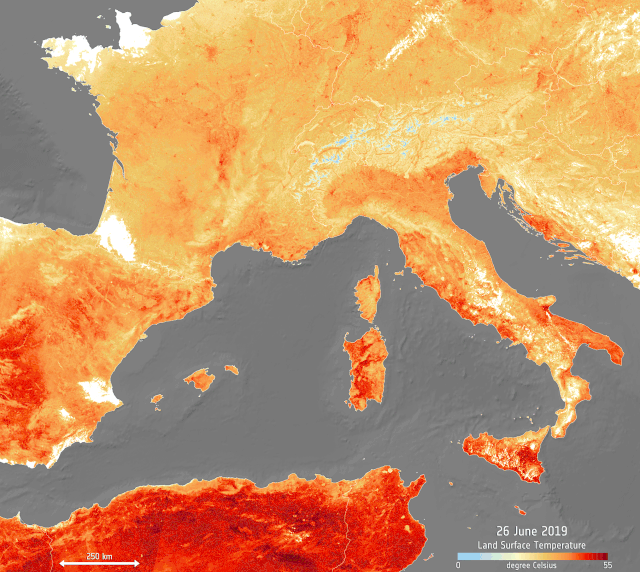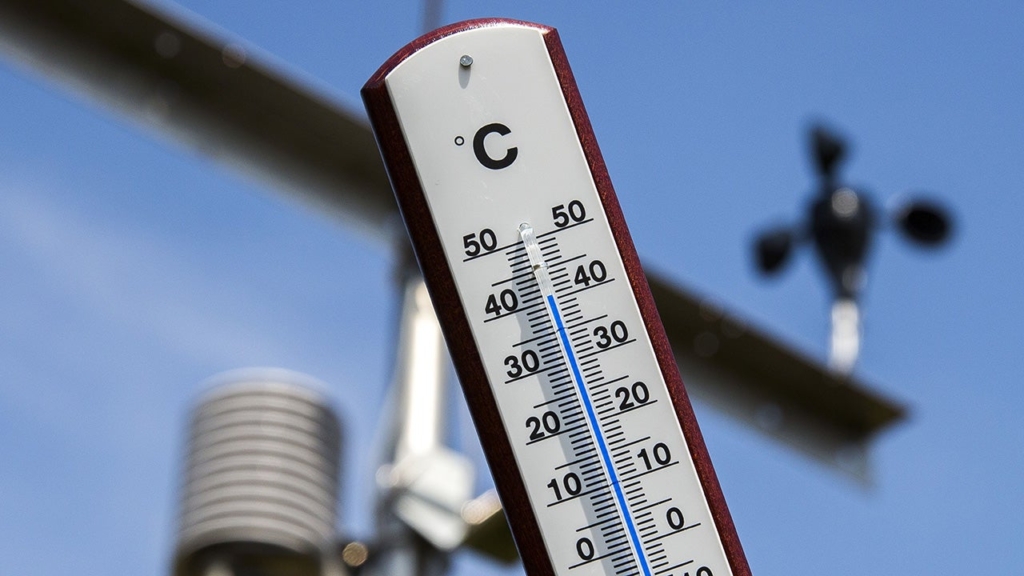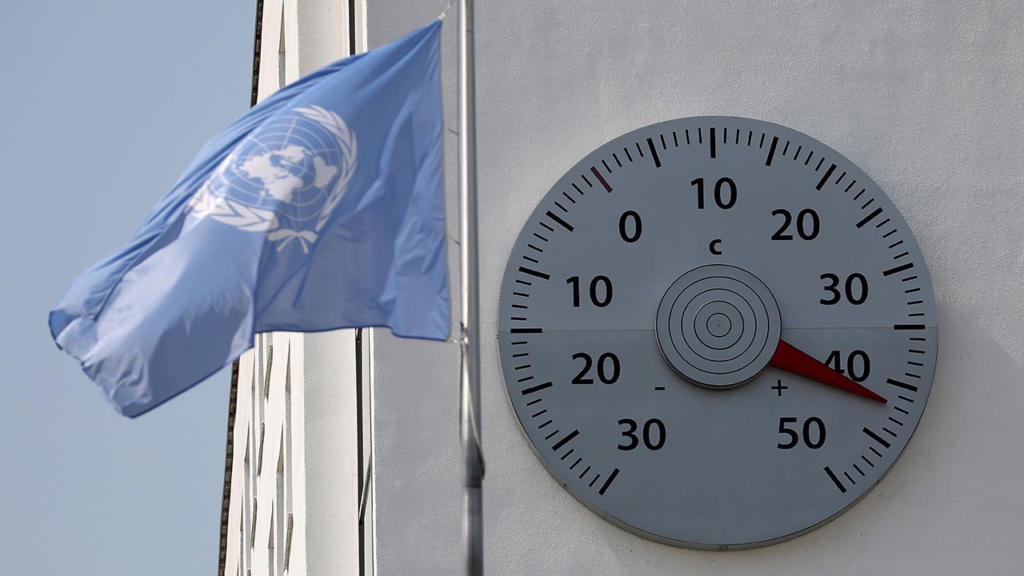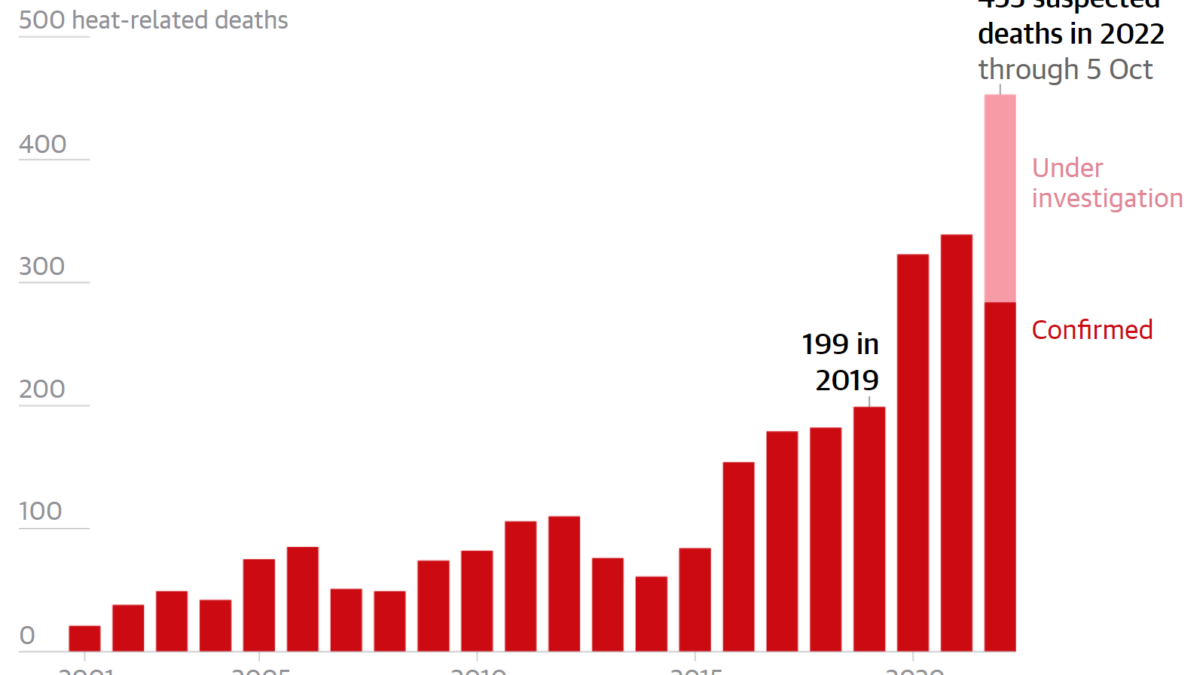The full scoop on Europe’s historic onslaught of heat – At least five nations had highest temperatures on record – Hottest day ever observed at hundreds of locations

By Bob Henson
26 July 2019
(Weather Underground) – Temperatures on Friday soared above 40°C (104°F) in Germany for an unprecedented third day in a row—and that’s just one in a mind-boggling swarm of all-time heat records set across western and northern Europe this week. At least five nations saw their highest temperatures on record, and in some cases the old national records were toppled at multiple locations and on consecutive days. The hottest air is now being shunted northeast toward higher latitudes, where it will inevitably cool, but it’s possible that one more country—Norway—will set an all-time high on Saturday. […]
One thing is clear: the chances are exceedingly small that this week’s European heat wave could have been so strong without the temperature platform being raised by greenhouse gases from fossil fuel use. Several attribution studies have shown that odds of such a heat wave have been boosted many times over by human-produced climate change, as we discussed in our last post. […]
There’s bitter irony in the fact that the birthplace of the landmark 2015 Paris Agreement on climate change experienced the “long tail” effects of human-produced climate heating in full force this week, while much of the United States—which has announced its intention to leave the agreement—basked in unusually cool weather for July. (The two hardly balance each other out, although some observers have implied as much. In fact, July has a very good shot at being Earth’s warmest month on record.)

Standouts from a hellish week
Below are some of the most amazing facets of this week’s European heat. In this article, we’ll list the records first as they were measured in degrees Celsius (which are used throughout the world outside the United States), followed by the Fahrenheit conversions.
Thursday was the hottest day ever observed at hundreds of locations where tens of millions of people live. An all-time heat record is a rare thing at any long-term observing site where temperatures have been measured for decades. On Thursday, virtually all of the primary weather stations in Belgium and the Netherlands set all-time records. In Germany, at least 139 locations saw all-time highs, representing a large chunk of the nation’s 400-plus observing sites, according to meteorologist Michael Theusner. And in France, at least 70 locations recorded all-time highs on Thursday, as compiled by international weather records researcher Maximiliano Herrera.

Some of the all-time records were set by large margins. The Montsouris observing site in Paris reached 42.6°C (108.7°F), which broke the city’s 72-year-old all-time heat record by an incredible 4°F. In far northern France, Lille broke its all-time record by more than 5°F, hitting 41.5°C (106.7°F).
One of the oldest weather observing sites on Earth had its hottest day on record. The Radcliffe Observatory in Oxford, England, has been making regular temperature measurements since 1815. On Thursday, the observatory hit 36.5°C (97.7°F), breaking the all-time high of 35.1°C (95.2°F) set on August 19, 1932, and August 3, 1990. The new Radcliffe record was confirmed in an email from Stephen Burt, author of the definitive book Oxford Weather and Climate Since 1767.
Three nations set new all-time highs on Wednesday and then promptly broke them on Thursday. What’s more, a good number of cities piled onto the national breaking of heat records. Up until Tuesday, no city in Germany had been hotter than the 40.3°C (104.5°F) recorded in Kitzingen on July 5 and August 7, 2015. At least eleven German locations beat that mark on Thursday, as shown below, and at least ten places in the Netherlands were hotter on Thursday than anything observed in the entire country prior to Wednesday. […]

Thursday’s heat by the numbers
Below is a preliminary sampling of Thursday’s all-time highs. All of the stations have at least 40 years of recordkeeping, and many have records going back a century or more. A few additional all-time local records occurred on Friday in Scandinavia, and more can be expected on Saturday. See our last post for a roundup of Tuesday and Wednesday’s all-time highs. Many thanks go to Maximiliano Herrera, Etienne Kapikian (Meteo-France), French climatologist Jérôme Reynaud, and Michael Theusner for compiling and furnishing these records. […]
France
Saint Maur (suburb of Paris) 43.6°C (110.5°F)
La Brosse 42.9°C (109.2°F)
Paris Montsouris 42.6°C (108.7°F)
Chablis 42.6°C (108.7°F)
Nemours 42.5°C (108.5°F)
Sens 42.4°C (108.3°F)
Bouy-sur-Orvin 42.4°C (108.3°F)
Paris Le Bourget 42.1°C (107.8°F)
Chatillon sur Seine 42.1°C (107.8°F)
Romorantin 42.0°C (107.6°F)
Bretigny 42.0°C (107.6°F)
Paris Orly 41.9°C (107.4°F) [more]
The Full Scoop on Europe’s Historic Onslaught of Heat

Heat, then hail: Weather and travel woes hit Britain, France
By Natasha Livingstone
26 July 2019
LONDON (AP) – The temperature’s dropping but Europe’s troubles aren’t over: A record-busting heat wave gave way Friday to thunderstorms and hailstorms, bringing the Tour de France to a dramatic halt and causing trouble at British airports and beyond on one of the most hectic travel days of the year.
In addition, travelers at London’s Heathrow and Gatwick airports faced delays because air traffic controllers grounded flights over a technical problem.
It marked the second day of travel disruptions in European capitals after one of the hottest days in memory, when many places in Western Europe saw temperatures soar beyond 40 degrees Celsius (104 degrees Fahrenheit). Compounding that, the weekend is a big travel moment across Europe as families head off for their summer holidays now that schools have broken up for the academic year.

After several hours of flight restrictions over U.K. airspace Friday, the national air traffic controller NATS said it had fixed the technical issue and would be able to safely increase traffic flow.
“Weather is continuing to cause significant unrelated disruption across the country and more widely across Europe, which has further complicated today’s operation,” NATS said in a statement.
In France, suffocating heat turned into slippery storms Friday — including a hailstorm on the Tour de France route in the Alps that was so sudden and violent that organizers ordered a stop to the world’s premier cycling event.
As riders careened down hairpin turns after mounting a 2,770-meter (9,000-foot) peak, a storm lashed the valley below. A snowplow worked desperately to clear the route of slush, but organizers deemed it too dangerous to continue.
Weather almost never stops the three-week race, and the decision came on a day of high-drama in which race leader Julian Alaphilippe lost his top spot and accompanying yellow jersey just ahead of Sunday’s finale.
British rail commuters were also facing delays after the heat wave prompted Network Rail to impose speed restrictions in case the tracks buckled. Engineers from the company have been working to get the network back to normal after the track temperatures soared to up to 20 C (68 F) more than the air temperature.
“With the railway being made of metal and moving parts, the sustained high temperatures took their toll in places,” said Phil James of Network Rail. “Everything was done to keep trains moving where possible, and last night hundreds of staff were out fixing the damage and repairing the railway ready for today.”
Passengers using Eurostar services to and from Paris were also facing “severe disruption” due to overhead power line problems in the French capital, which on Thursday recorded its hottest day ever with the temperature rising to 42.6 C (108.7 F). [more]
Heat, then hail: Weather and travel woes hit Britain, France


